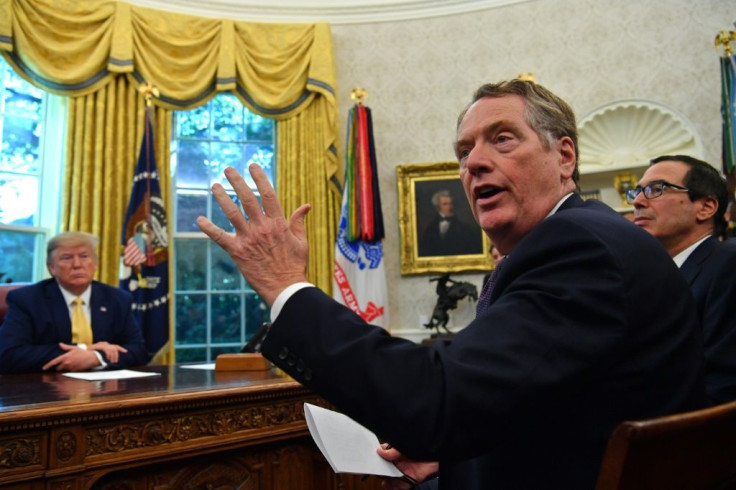US-China Phase One Trade Deal 'Totally Done'; No New Tariffs, Lighthizer Says

KEY POINTS
- Trump postpones new U.S. tariffs on Chinese goods and halves tariffs on some other good
- Lighthizer said it's now up to China to make the deal work
- In exchange for the significant U.S. concessions, China promises to buy American soybeans and agricultural produce
With the phase one interim trade deal between the United States and China "totally done," the challenge facing both countries now is to make phase one work so there can be a phase two, phase three and other phases. U.S. Trade Representative Robert Lighthizer said subsequent phases will depend on how the first phase is implemented and enforced.
“It really is a remarkable agreement, but it’s not going to solve all the problems,” said Lighthizer said on CBS' "Face the Nation."
“Whether this whole agreement works is going to be determined by who’s making the decisions in China, not in the United States. If the hard-liners are making the decisions, we’re going to get one outcome. If the reformers are making the decisions, which is what we hope, then we’re going to get another outcome.”
Lighthizer added, “This is totally done. Absolutely.”
He claims phase one includes more than agriculture. He alleges it has real enforcement mechanisms and provisions that address currency and financial services, but without specifying what these are.
“We expect the trade deficit to go down for sure,” said Lighthizer. He claims the formal agreement will likely be signed first week of January and take effect 30 days later.
"Everything is written,” he said to reporters on Friday. “Everything is completely finished.”
Under the deal, the U.S. will retain the existing 25 percent tariffs on $250 billion of Chinese imports. It will, however, reduce tariffs on $120 billion in products to 7.5 percent from 15 percent. The tariff reduction will take effect 30 days after the agreement is signed. President Donald Trump has promised not to impose the 15 percent tariffs that were to have been levied Dec. 15.
Oddly, the only solid compromise China seems to have made in exchange for the generous U.S. concessions is to promise it will substantially increase agricultural purchases. What's clear is China hasn't specified an exact amount of the purchase it plans to make. Trump, however, is again claiming China had promised to buy $50 billion in American soybeans. He first made this claim back in early October when the phase one deal first made the news. China never bought the $50 billion in soybeans Trump claimed it had agreed to buy at the time.
Analysts noted phase one does nothing to address the four core issues Trump claims are the aims of his trade war with China. These fundamental aims left to be tackled in future phases are halting China's theft of U.S. intellectual property rights (IPRs); ending China's forced transfers of technology from U.S. firms doing business inside China; impeding Beijing's fiscal support for its state-owned enterprises (SOEs), which is tantamount to an unfair trade advantage; and forcing fundamental changes to China's communist-style command economy.
Skeptics noted the Trump administration has released no detailed documents on the phase one deal. It's unlikely this Friday the Thirteenth deal delivers enough benefits for the U.S. to outweigh the costs of the trade fight so far, said Mary Lovely, a trade economist at the Peterson Institute for International Economics.
“Many of us are highly skeptical that the agreement will be enough to outweigh these other costs,” noted Lovely. “The U.S. didn’t move the needle very much.”
Scott Kennedy, a China specialist at the Center for Strategic and International Studies (CSIS) agreed. He said by ceding only limited concessions, "China has been able to preserve its mercantilist economic system and continue its discriminatory industrial policies at the expense of China’s trading partners and the global economy."
“Trump could reverse course and renew tariffs. But Beijing has bought itself a likely respite from the daily uncertainty for at least a few months and perhaps for the remainder of Trump’s current term," said Kennedy.
© Copyright IBTimes 2025. All rights reserved.





















